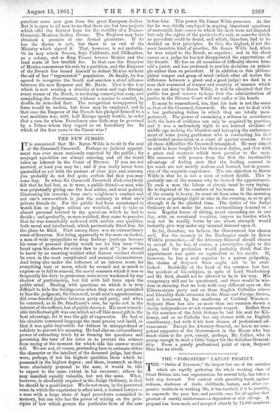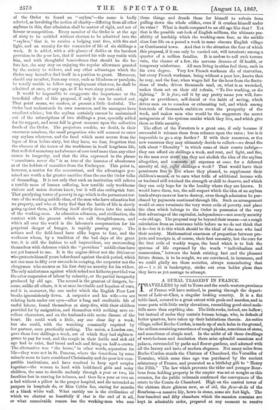THE "FORESTERS" LATEST PROJECT.
rpHE "Order of Foresters," the largest but one of the societies which are rapidly gathering the whole working class of Great Britain into vast organizations for mutual help, has taken a bold step forward. Not content with providing funds against sickness, slackness of trade, childbirth, burials, and other ex- pensive incidents in working life, it has resolved, if it be possible, to supersede the poor law, and provide once for all against that greatest of earthly misfortunes—a dependent or sick old age. A proposal has been made and accepted already by 15,000 members
of the Order to found an " asylurn"—the name is badly selected, as involving the notion of charity—differing from all other asylums in this, that admission shall be matter of right, and not of favour or competition. Every member of the Order is at the age of sixty to be entitled without election to be admitted into the "asylum," that is, to receive a lodging rent free, with fire and light, and an annuity for the remainder of life of six shillings a week. It is added, with a side glance of dislike at the harshest provision in the poor law, that if married his wife may reside with him, and with thoughtful benevolence that should he die be- fore her, she may stay on enjoying the regular allowance granted by the society to widows, and any other advantages which the • Order may hereafter find itself in a position to grant. Moreover, should any member, from any cause, such as blindness or paralysis, be totally unable to follow any employment whatever, he shall be admitted at once, at any age, as if he were sixty years old.
It would be impossible to exaggerate the importance or the beneficial effect of this proposal, if only it can be carried out. That point seems, we confess, at present a little doubtful. The Order best understands its own resources, and its managers have excellent advice ; but the asylum certainly cannot be maintained out of the subscriptions of two shillings a year, specially added for its support, and must fall in great measure upon the collective funds of the Order. The projectors confide, no doubt, in their enormous numbers, the small proportion who will consent to enter any asylum whatever, and the fund which must accrue from the lapse of lives before sixty, but they have, we fear, forgotten that the absence of the terror of the workhouse in itself lengthens life, that well-fed monotony and absence of care tend more than any other causes to longevity, and that the idea expressed in the phrase "annuitants never die" is as true of the inmates of almshouses as of the holders of annuities from the Exchequer. This point is, however, a matter for the accountant, and the advantages pro- mised are worth a far greater sacrifice than the one the Order talks of demanding. It is not only that such an institution will relieve a terrible mass of human suffering, how terrible only workhouse visitors and union doctors know, but it will also extinguish fear. That paralyzing terror of poverty in age which is the permanent tor- ture of the working middle class, of the men who have education but no property, and who at forty find that the battle of life is slowly going against them, is filtering itself slowly down into the minds of the working-men. As education advances, and civilization, the content with the present which we call thoughtlessness, and which all over the world is the labourer's compensation for his perpetual danger of hunger, is rapidly passing away. The artizan and the field-hand have alike begun to fear, and the workmen whom, by a tradition of the bad days of the great war, it is still the fashion to call improvident, are surrounding themselves with defences which the " provident " middle class have not yet learned to use. It is the engine-driver not the littlrateur who protects himself years beforehand against the sick period, which not one man in fifty ever succeeds in escaping, the carpenter not the clergyman who secures as his first duty an annuity for his widow. The only misfortunes against which nehad not hitherto provided was the utter suspension of labour by calamity, or the partial incapacity produced by old age. The second is the greatest of dangers, be- cause, unlike all others, it is at once inevitable and hopeless of cure, and it is, moreover, the one under which the English Poor Law breaks ignominiously down. A carpenter and his wife—we are relating facts under our eyes—after a long and creditable life of useful labour, found themselves at sixty-five, with their children provided for by emigration, and themselves with nothing save ex- cellent characters, and on the husband's side acute disease of the heart. He could work a little, say one clear day a week, but she could, with the watching constantly required by her partner, earn practically nothing. The union, a London one, gave them four shillings a week, out of which they had eighteen- pence to pay for rent, and the couple in their feeble and sick old age had to exist, find bread and salt and firing on half-a-crown. The alternative was "the house," in other words, separation for life—they were not in St. Pancras, where the Guardians by some miracle seem to have considered Christianity and the poor law com- patible institutions, and have resolved to keep aged couples together—the woman to herd with bold-faced girls and noisy children, the man to dawdle uselessly through a year or two, his faculties lost in craving for tobacco, and then lie a year or two on a bed without a pillow in the pauper hospital, and die untended as paupers in hospitals do, or Miss Cobbe lies, staring for months at a blank white wall. What earthly use is the civilization of which we chatter so boastfully if that is the end of it all, or what conceivable reason has the working-man who sees these things and dreads them for himself to refrain from pulling down the whole edifice, even if it crushes himself under its ruins ? What is death compared to an old age like that ? Yet that is the possible out-look of English millions, the ultimate pos- sibility of hardship which the working-men fear, as the middle class fear life on a pound a week in some obscure English village or Continental town. And that is the situation the fear of which this proposal, if it can only be carried out, will terminate among a quarter of a million families. It is useless to call such terrors vain, the chance of a few, the nervous dreams of ill health, or temporary misfortune. All men living in cities feel them, each in his own degree. Very few French workmen die of starvation, but every French workman, being without a poor law, knows that he may, and the fear, when wages fail for the hour from the fluctu- tions of trade, drives thousands mad, or, what is as wretched, makes them act on their old refrain, "To live working, or die fighting." It is fear, call it by any pretty name you will, fore- sight or providence, self-denial or the habit of saving, which drives men on to ceaseless or exhausting toil, and which among hundreds of thousands embitters even the prosperity of the week, and makes men who would be the supporters the secret antagonists of the systems amidst which they live, and which give them so little security.
The effort of the Foresters is a great one, if only because if successful it releases them from reliance upon the rates ; but is it impossible to go a step farther? If with their resources, or the new resources they may ultimately decide to collect—we dread the talk about " liberality " in which some of their courts indulge— they can afford six shillings a week, and rent, and light, and fire, to the man over sixty, can they not abolish the idea of the asylum altogether, and commute all expenses at once for a deferred annuity of, say, eight shillings a week? That would leave their pensioners free to live where they pleased, to supplement their children's meant or to earn what trifle of additional income wife or husband still retained the strength or skill to deserve, and which they can only hope for in the locality where they are known. It would leave them, too, the self-respect which the idea of an asylum tends always more or less to destroy, even though admission be pur- chased by payments continued through life. Such an arrangement would at once terminate the very worst evils of poverty, and place the class which belongs to the Order in possession of the very first advantage of the capitalist, independence—not merely security —in old age. The proposal may be beyond their means—on a rough calculation from an insurance table before us we do not think that it is—but it is this which should be the ideal of the men who lead their society. Mathematical exactness of proportion between pro- jects and receipts is, of course, their first necessity, but the cure for the first evils of weekly wages, the bond which is to link the systems of life expressed by the words "individualism and communism," between the harsh existing fact and the pleasant future dream, is to be sought, we are convinced, in insurance, and we could gladly see these societies, always remembering that 50— 1 x 51 is bankruptcy, strike out even bolder plans than they have as yet courage to attempt.































 Previous page
Previous page